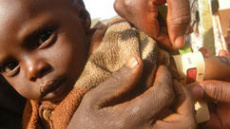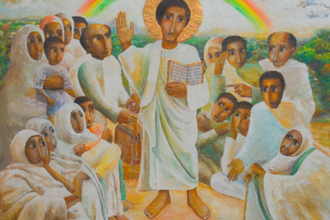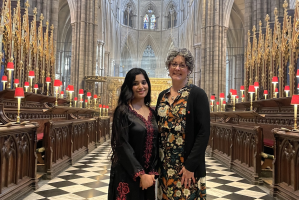Horn of Africa food crisis one year on

Refugee baby in Kenya - image CAFOD
Last year more than 13 million people in Ethiopia, Kenya, Somalia, and the newly-formed Republic of South Sudan were left in need of food, water and emergency healthcare because of one of the worst droughts in 60 years.
In Somalia hundreds of thousands of people fled across the border into north eastern Kenya and into one of the world's largest refugee camps, Dadaab, fleeing drought and conflict, with parts of the country affected by famine.
At the time CAFOD Church partners in the north of Kenya told us that it was the worst drought in living memory, and the United Nations officially declared famine in six regions of Somalia.
CAFOD supporters across England and Wales raised five million pounds, which meant that CAFOD's partners on the ground have been able to save lives providing emergency food aid to the most vulnerable, through running health and nutrition services to support malnourished children and mothers. Pastoralist herders have been provided with animal feed and veterinary support to keep their prime breeding livestock alive so that herds can be built up when conditions improve.
One year on from the drought, recovery is slow, but there are small shards of hope. The "short rains" in October and November 2011 were mostly normal or above normal, which helped to improve water supplies and pasture for livestock, and led to a good harvest in early 2012 in areas dependent on those rains. However, the "long rains" from March to May 2012 have been poor in some areas, which could slow down the recovery. Conflict and displacement also continue to cause severe food shortages in parts of Somalia and South Sudan.
Director of CAFOD, Chris Bain has recently returned from a visit to Kitui in eastern Kenya where he saw for himself the fragile recovery of communities being supported by CAFOD partner Caritas Kitui: "The most impressive innovation was the vegetable garden in a bag. Families able to grow vegetables inside a large sack and in so doing they were able to be more efficient with the little water that they had. There were also community goat schemes and the construction of earth dams to catch flash flood waters. These projects are truly supporting communities living in these semi-arid lands to be better able to cope to their changing climatic environment."
In general, droughts are occurring in East Africa increasingly often and communities living in arid or semi-arid regions of East Africa live a very fragile existence, because of their previous reliance on predictable seasonal rains. As precipitation patterns become unpredictable, the poorest families suffer the most.
Chris Bain concluded that the upcoming Olympics Hunger Summit planned by Downing Street was an opportunity for the UK and countries such as Kenya and others in the Horn and East of Africa to work together to change the approaches to the ways in which food crises are handled:
"This is an opportunity to put global food security centre stage and look at the food systems that keep the poorest people in the world eating only the crumbs from the global food table."
Dr Kate Crowley is CAFOD's Disaster Risk Reduction expert. She says that building resilience amongst communities will enable them to better survive the now all too familiar cyclical pattern of drought. She said: "Governments, scientists, communities and NGOs need to work together to move away from reaction and look towards prevention. We all need to take the long-term view, working with vulnerable communities to address ways in which they can cope better the next time the rains fail.
"We need to tap into the meteorological information and related technology available so as to better inform farmers as to how they can adapt their planting season to coincide with the changing rainfall patterns. And of course we must make better use of Early Warning Systems so that humanitarian aid when needed is timely and appropriate."
For more information see: www.cafod.org.uk/giving/emergency-response-fund/east-africa-crisis
Source: CAFOD


















